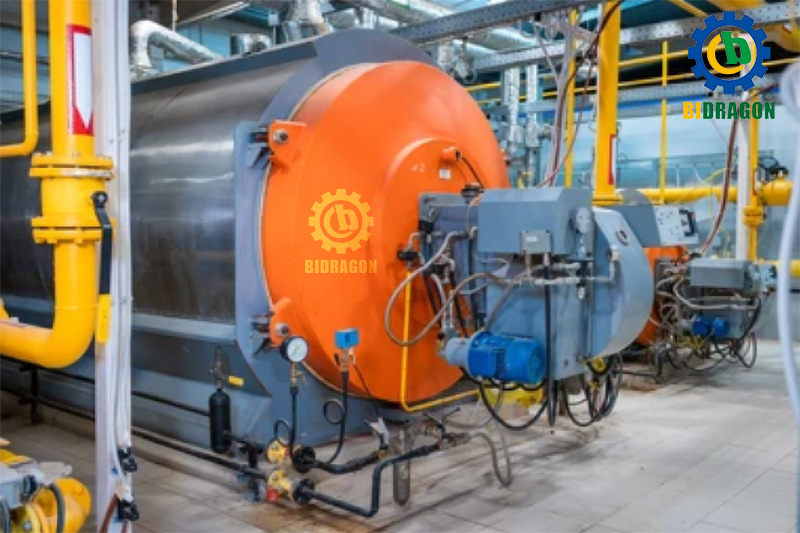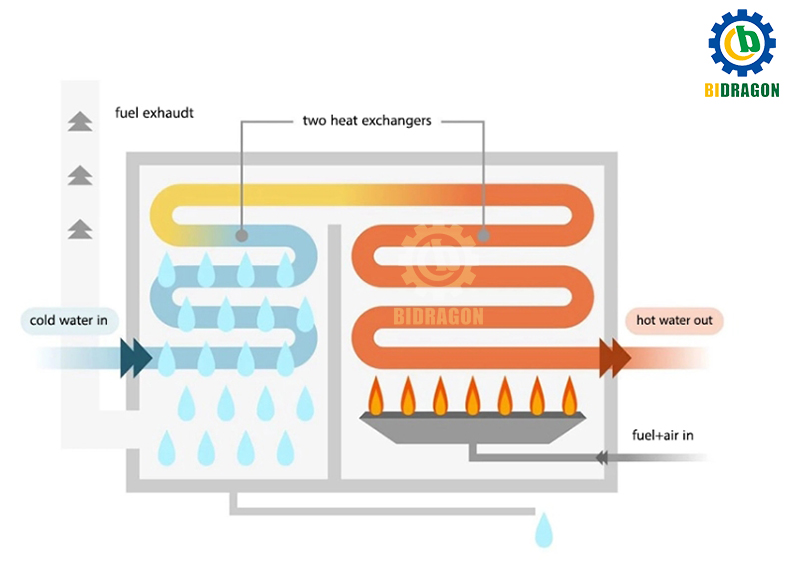In industrial production, energy consumption and carbon emission are always the key factors restricting the sustainable development of enterprises. Industrial Condensing Boiler (Industrial Condensing Boiler), as a kind of energy efficient thermal equipment, is becoming the first choice of many industrial enterprises. Condensing boiler is a kind of boiler equipment to improve the thermal efficiency by recovering the latent heat of water vapor in the flue gas, and its working principle is based on the deep utilization of the waste heat of the traditional boiler, which can maximize the heat generated by the combustion of fuels into usable thermal energy.
With the increasingly stringent global requirements for energy saving and emission reduction, there is an urgent need for efficient heating solutions in the industrial sector. In the combustion process of traditional boilers, a large amount of heat is discharged into the atmosphere along with high-temperature flue gases, which not only results in energy waste, but also increases the operating costs of enterprises. The industrial condensing boiler with its excellent thermal efficiency, can significantly reduce energy consumption, reduce carbon emissions, thereby meeting environmental regulations, while enhancing the economic benefits of enterprises. Therefore, industrial condensing boilers play a central role in promoting energy saving and emission reduction in the industrial field and realizing sustainable development.
Condensing Boiler is a kind of boiler equipment that recovers latent heat by condensing water vapor in the flue gas to improve thermal efficiency. The principle of operation is: fuel combustion in the boiler to produce high temperature flue gas, flue gas in the heat exchanger and cold water heat exchange, the heat transfer to the cold water, so that the cold water to warm up into hot water or steam. In this process, when the flue gas temperature is reduced to below the dew point temperature, this temperature is usually around 55℃, the flue gas in the water vapor begins to condense into liquid water, releasing latent heat. This latent heat is recovered again through the heat exchanger, improving the thermal efficiency of the boiler.
Compared with conventional boilers, condensing boilers have significant advantages in terms of thermal efficiency, condensation process and heat recovery. The thermal efficiency of a conventional boiler is usually in the range of 80% - 90%, while the thermal efficiency of an Energy-Efficient Condensing Boiler can be as high as 95% or more. During the operation of traditional boilers, the flue gas is discharged directly, and a large amount of latent heat is wasted; whereas condensing boilers recycle the latent heat in the flue gas through a specially designed heat exchanger, thus realizing higher energy utilization.

The working principle of fire-tube condensing boiler is that high-temperature flue gas flows inside the fire-tube and exchanges heat with water outside the tube. Typical applications include heating, hot water supply in small to medium sized industries and process heating where steam is not required. The advantage of the water-tube condensing boiler is its high efficiency and adaptability to a wide range of fuels, whether it is natural gas, fuel oil or biomass fuel, can be burned stably to meet the needs of different enterprises.
Water-tube condensing boilers are characterized by water flowing inside the tubes and flue gases flushing outside the tubes, a design that allows the water to absorb heat quickly and produce high-temperature, high-pressure steam. Water tube condensing boilers are suitable for large industrial production scenarios, such as power plants and chemical plants, and are capable of meeting large-scale steam demand.
The Coil-Type Condensing Boiler realizes efficient heat transfer through spiral tubes. The design of the spiral tube increases the surface area for heat exchange, allowing for a fuller heat exchange between flue gas and water. Suitable burner types include pre-mixed and non-premixed burners. Pre-mixed burners allow the fuel to mix with the air to achieve more efficient combustion, which further improves the thermal efficiency of the boiler.
The Compact Condensing Boiler utilizes a unique cross-flow design for efficient heat exchange. This design allows the boiler to achieve high heat exchange efficiency in a limited space. Designed for high efficiency industrial heating, this design is particularly suitable for industrial scenarios where space is limited but high heating efficiency is required.
The Condensing Boiler Working Principle revolves around the efficient conversion of heat energy. First, fuel is mixed with air in a burner and burned to produce high-temperature flue gases. The high temperature flue gas enters the heat exchanger and transfers heat to the cold water, raising the temperature of the cold water. As the flue gas temperature continues to decrease, when it reaches below the dew point temperature, the water vapor in the flue gas begins to condense into liquid water, releasing latent heat.
Latent Heat Recovery is the key to efficient operation of condensing boilers. Through the specially designed condensing heat exchanger, the latent heat in the flue gas can be fully recovered and utilized, and this part of the heat will be transferred to cold water again to further increase the temperature of hot water or steam. Compared with traditional boilers, condensing boilers maximize the use of heat generated by fuel combustion in this way, achieving higher thermal efficiency, and becoming a truly high-efficiency condensing boiler.

The high energy efficiency of industrial condensing boilers can significantly reduce the energy costs of enterprises. With a thermal efficiency of over 95%, they can reduce energy consumption by 10% - 15% compared to conventional boilers. For an industrial enterprise that consumes 1 million cubic meters of natural gas per year, for example, the use of an industrial condensing boiler can save about 100 - 150,000 cubic meters of natural gas per year, which significantly reduces the operating costs of the enterprise.
condensing boilers reduce greenhouse gas emissions such as carbon dioxide by improving energy efficiency and reducing fuel consumption. This not only helps companies to fulfill their environmental responsibilities, but also meets increasingly stringent environmental regulations and avoids fines and other penalties for exceeding emission limits.
Industrial production requires a high degree of stability in heat supply, and any interruption in heat supply can lead to production standstill, resulting in huge economic losses. Industrial condensing boilers with advanced control systems, according to the actual demand for automatic adjustment of the heating load to ensure stable heat supply, to protect the continuity of industrial production.
condensing boilers are designed with compact structure and key components such as heat exchangers are made of corrosion-resistant materials, which reduces maintenance requirements. At the same time, its high degree of automation, real-time monitoring of operating conditions, timely detection and early warning of potential problems, reducing the difficulty and cost of maintenance, to achieve efficient and stable operation. These advantages make the industrial condensing boiler become an Energy-Efficient Industrial Boiler , which brings significant economic and social benefits for enterprises.
In the healthcare industry, the requirements for stability and hygiene of heating and hot water are extremely high. Industrial condensing boilers can provide efficient and stable heating and hot water to meet the needs of hospital wards, operating rooms, sterilization supply rooms and other places to ensure the comfort and safety of the medical environment.
Process heating and hot water supply in the manufacturing sector has a huge demand for thermal energy. Industrial condensing boilers are widely used in the chemical, food, and textile industries to provide reliable thermal support for production processes, thanks to their high-load heating capacity and stable performance.
The hotel and catering industry requires large-scale hot water supply to meet the needs of guest room bathing, kitchen cooking and so on. Industrial condensing boilers provide large quantities of hot water quickly and at low operating costs, making them ideal for hotels and restaurants.
Educational institutions such as schools and universities require heating for classrooms, dormitories and cafeterias. The energy-efficient nature of industrial condensing boilers can meet the heating needs while reducing the school's energy bills, creating a comfortable learning and living environment for teachers and students.
Commercial buildings such as office buildings and shopping malls require high energy efficiency in their heating and air conditioning systems. Industrial condensing boilers can be combined with air conditioning systems to provide efficient heating and cooling and improve the energy efficiency of commercial buildings. These application scenarios fully reflect the wide applicability of condensing boilers in different industries and highlight the importance of “Condensing Boiler Applications”.
Fire tube condensing boilers are simple in structure, low in investment cost, and suitable for small and medium-sized industrial enterprises and scenarios that do not have a high demand for steam; water tube condensing boilers are suitable for large-scale industrial production, and are able to satisfy high loads of steam demand, but the investment cost and maintenance cost are high, but the investment cost and maintenance cost are high, but the investment cost and maintenance cost are high. The water tube condensing boiler is suitable for large-scale industrial production and can meet the high load of steam demand, but the investment cost and maintenance cost is relatively high. Enterprises should choose the right type of boiler according to their production scale and heating demand.
The choice of burner directly affects the combustion efficiency and operating costs of the boiler. Pre-mixed burner can make the fuel and air fully mixed, combustion more fully, higher thermal efficiency, but the gas quality requirements are higher; non-premixed burner is suitable for a variety of fuels, adaptability. Enterprises should choose the right burner according to the type of fuel used and the requirements for thermal efficiency.
The heat exchanger material of a boiler is critical to its performance and life. Stainless steel heat exchangers have the advantages of corrosion resistance, high temperature resistance and high heat transfer efficiency, which can ensure the long-term stable operation of the boiler. When choosing an industrial condensing boiler, you should give preference to products with stainless steel heat exchangers to ensure the reliability and service life of the boiler, so as to select the Best Industrial Condensing Boiler.
The heat exchanger is the core component of the condensing boiler, and its cleanliness directly affects the heat exchange efficiency. Regular cleaning of the heat exchanger to remove scale and impurities from the surface will prevent a reduction in heat exchange efficiency and ensure efficient operation of the boiler.
Condensing boilers produce acidic condensate during operation, which needs to be neutralized by the condensate neutralizer to ensure safe discharge. Regularly checking the working condition of the condensate neutralizer and adding neutralizer in time can prevent acidic condensate from corroding the drainage system.
During boiler operation, the internal pressure is under dynamic change. Regular pressure checks to ensure that the pressure is within the safe range can prevent safety accidents caused by excessive pressure and ensure the safe operation of the boiler.
In addition to routine maintenance, professional boiler maintenance personnel should be invited to carry out a comprehensive inspection and maintenance of the industrial condensing boiler every year. Professional maintenance can detect potential problems in time and make repairs and adjustments to ensure the boiler operates efficiently for a long time. These maintenance measures correspond to the important elements of “Condensing Boiler Maintenance” and “Industrial Boiler Maintenance”.
In summary, industrial condensing boilers are remarkably efficient and economical in the industrial sector. Its advantages of high energy efficiency, low emission, stable heating and low maintenance cost make it an ideal choice for industrial enterprises to realize energy saving and emission reduction and reduce operation cost.
When choosing an industrial condensing boiler, enterprises should consider factors such as the type of boiler, burner and material according to their own production needs, fuel type and budget; in terms of maintenance, regular maintenance and servicing should be carried out in strict accordance with the maintenance guidelines to ensure the long-term stable operation of the boiler. Through reasonable selection and maintenance, industrial condensing boilers can bring great economic and social benefits to enterprises, and are a reliable and efficient heating solution for industrial applications.